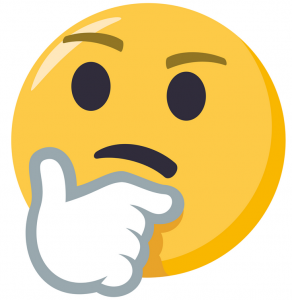Is Tech Taking Us Backwards?

The focus du jour seems to be regulation of the internet, and the fact that now even Mark Zuckerberg wants new legislation to limit speech. How interesting that in twenty-odd years, we’ve gone from the internet being a vehicle where information wants to be free, to censorship.
If this is what you’re focused on, you’re missing something. Namely, the fact that the current push is not only for censorship of speech, but concurrently, for no speech at all.
We’re talking about emojis, emoticons and bitmojis that have been creeping into our online discussions and which have been growing at an alarming rate, not only in text messages, online chats on video broadcasting platforms and on the socials, but in emails as well.
When was the last time you composed a text message and an emoji didn’t appear to replace some of the wording you were using? Unprompted… There they are, in practically every message you attempt to compose.
We were recently meeting with an associate towards the end of a workday, and her 11-year-old son had been texting her – which were the only texts she paid any mind to during the meeting. After a while, she rolled her eyes and shook her head.
“Is everything all right?” we inquired.
She shared her son’s texts with us, scrolling up into messages that he had sent long before our meeting.
Not a word was written. His texts were comprised of an endless series of emojis, emoticons and bitmojis.
“This is how he and his friends communicate,” she said. “They don’t even teach cursive writing in school anymore.”
And note: his is a fairly upscale, progressive New York City school.
So, is this online shorthand, or the next step in the breakdown of communication?
It’s just a ❓
🤦♀️
There’s no doubt that technology is divisive, and Facebook over the years has manipulated emotions, behavior, consider the censorship in which all of the major platforms engage. Case in point: Google dissolves newly formed AI ethics board. Google’s external ethics board has been controversial from the start. It seems one of the board’s members was Kay Coles James, the president of conservative Heritage Foundation, so it seems that Google employees felt that not all voices and points of views need to be heard.
The board existed for just about a week’s time.
We’re not suggesting that tech has conspired to eliminate language, although considering their global agenda, emojis, et al are certainly a start to eliminating language barriers – while simplifying thoughts, statements and ideas, of course.
There’s no doubt that the tech cartel have been involved in various scandals and unethical practices that are at odds with the public good, and we just wonder if the next step may well be the dumbing down and – if we want to be seriously paranoid – the elimination of articulate communications itself.
As of 1989, there were 171,476 in the Oxford English Dictionary, plus 47,156 obsolete words. There aren’t more than a few hundred emojis, at most.
Emojis are ideographic, like certain road signs, and while they may have their place, as conversations in and of themselves, they do remove the nuances of a robust language – and vocabulary.
Our associate was a bit concerned when she noticed our expression after perusing her son’s series of texts.
“Have you ever seen anything like this?” she asked.
We replied without hesitation.
“Cave paintings.”
The way preliterate mankind communicated.
Onward and forward.